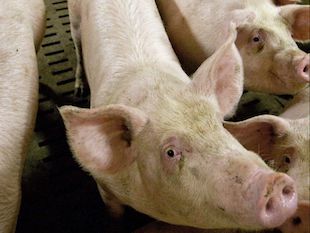| Farmed animals in Canada are facing a significant new threat. The trend towards what is now known as “ag gag” laws has been gaining momentum in recent years. Such laws are designed to allow farms to practice business-as-usual and to silence whistleblowers who might otherwise bring to light cases of neglect and abuse. In a country where we’ve long taken free speech rights for granted, this development is nothing short of astonishing. And as a precedent it’s certainly troubling. It’s almost as if Canadians value access to cheaper meat over on our own rights to freedom of expression. And as far as compassion for other species goes, forget it! Whatever it takes to keep food prices down. Is this really who we are? Whistleblower exposés frequently reveal the horrific cruelty that is standard practice on some farms in Canada. They provide an opportunity to make the public aware of abuses when they occur. Undercover videos often provide crucial evidence leading to prosecutions and convictions in animal cruelty cases. Ag gag laws originated in the US, but by this point in time there’s been sufficient resistance mounted in that country that in many instances they’ve been struck down by the courts as being unconstitutional. Which of course they are. There is such a thing as the First Amendment, after all. But in Canada, a relative late comer in this area, these dangerous laws are still on somewhat of an upward trajectory. Lobbying for these laws didn’t start in this country until 2019, but the Canadian farm industry lobby is a powerful one, and its impact has certainly been felt already. Did you know that in Alberta, since late 2019, much of the cruelty that might take place on farms, in puppy mills, and in the exotic pet trade is now protected from the public’s view by ag gag laws? Or that under Ontario’s law passed just this year, not only can you be charged for blowing the whistle on cruelty, but even if you offer water to animals suffering inside transport trucks shipping them in the suffocating heat of summer? Or that Quebec, British Columbia and Manitoba are now considering proposals for their own similar laws? |
So we have a choice to make. Is the general thrust of our legislation going to be towards laws intended to improve the lives of animals, or are we going to punish compassion and effectively cover up abuse? Now is the time that advocacy groups, and the lawyers that represent them, are challenging these obscene laws in court. We need them to succeed before this cancer spreads to the rest of the country. And remember that the terrible precedent set by these laws threatens you not only if you care whether animals are treated compassionately, but if you value your rights to free speech. We have to believe that we can be better than this. We can afford to pay a little more for our food if that’s what it takes. Or we will find innovative ways to create efficiencies that will keep food affordable, without it coming at the price of the suffering of others. Your alternative is to enshrine in the law a food producer’s ability to use whatever means necessary to keep production costs down. Which choice are you prepared to make? |
For The Orca’s Voice,
Dani, Canadian Cetacean Alliance



Leave a Reply